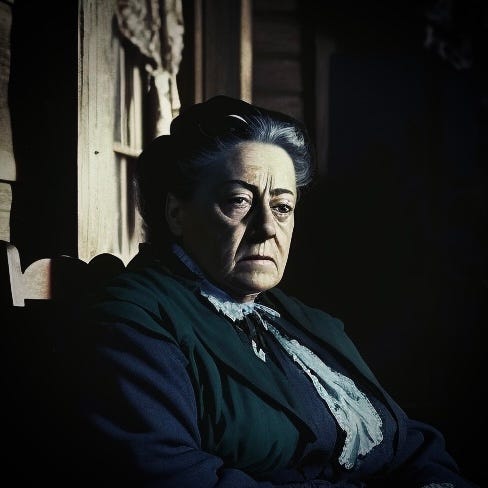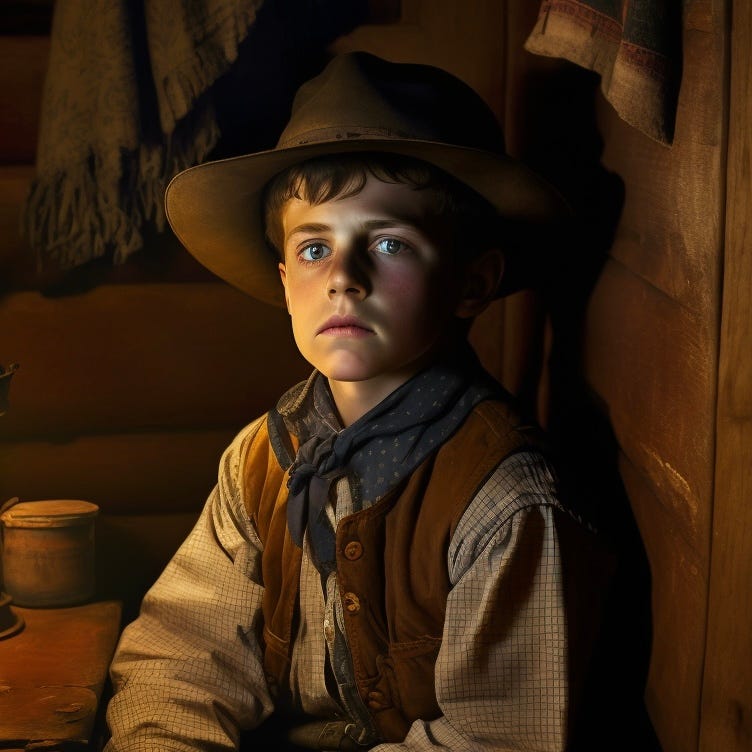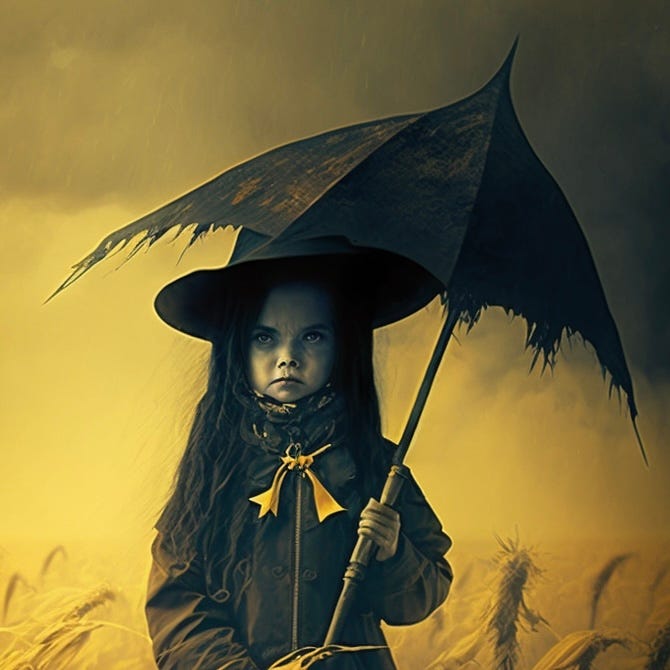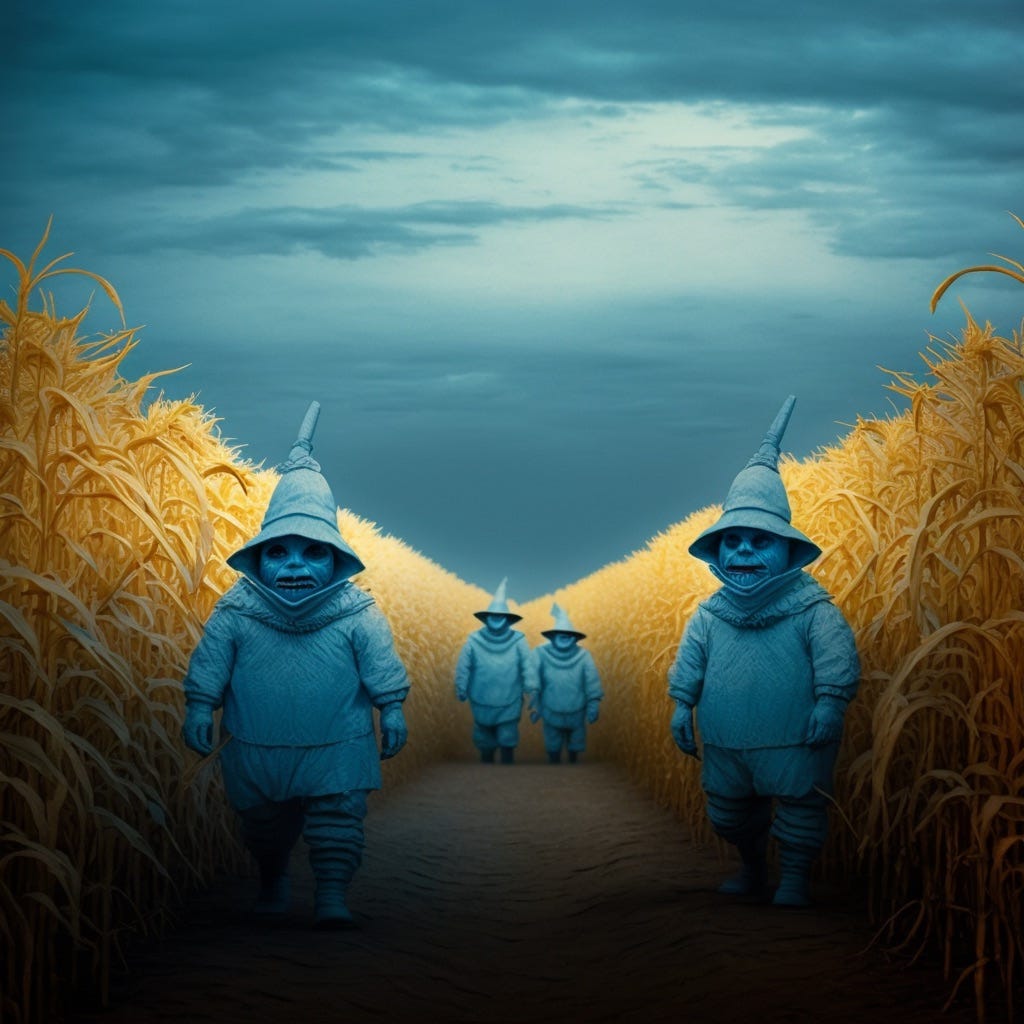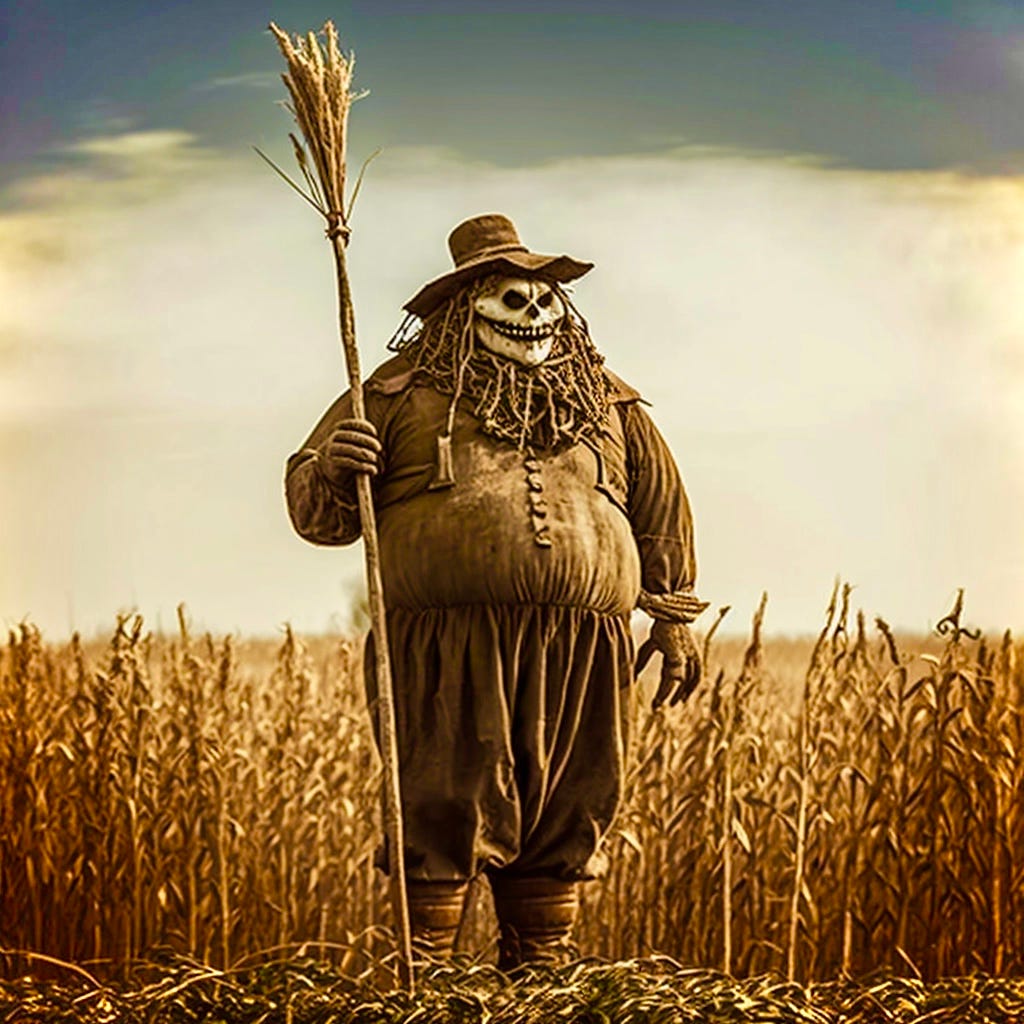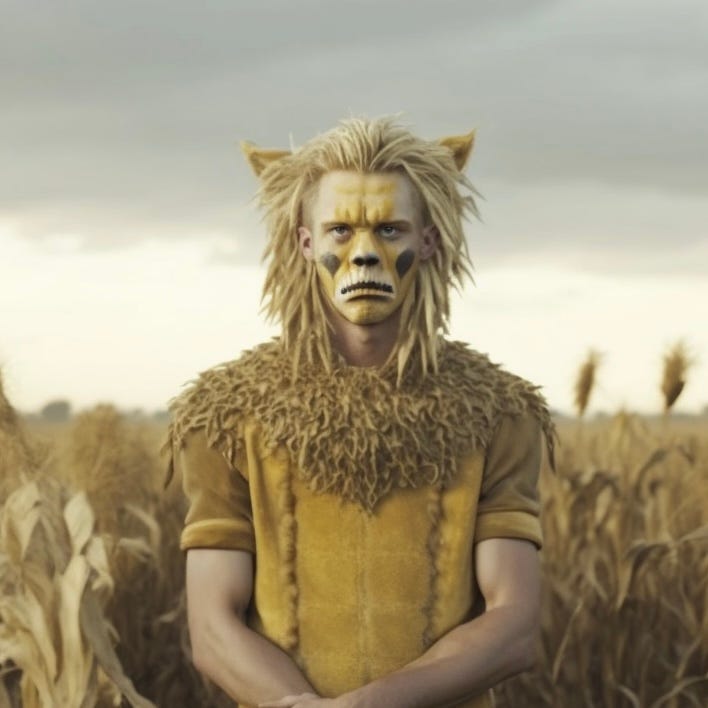If you’re joining us just now, follow the snake’s tail to the Prologue or climb a ladder to the Table of Contents.
Chapter 15: Follow the Golden Path
A rumble of thunder echoed from the slow-rolling clouds over the homestead on the prairie. On the roof of the barn a weathervane (shaped like the dancing Shiva) turned and creaked in the wind. The small clapboard house seemed devoid of life, although there was life (of a sort) inside it.
In the dim glow of a coal-oil lamp, two children played Snakes and Ladders on the pine floorboards. But the children weren’t the only ones in the house. Near the cast-iron stove, Madame Blavatsky sat in a rocking chair, smoking a corncob pipe. She stared at the game board with her faraway eyes.
“I’m tired of playing,” Evan said.
“Then let’s take a break,” Niyati replied. She pushed up her glasses. “Maybe Granny will tell us a story.”
Madame Blavatsky spoke to the children in a thick Slavic accent. “What story do you want to hear?” she asked (although she already knew the answer).
Evan touched his chin. “Tell us the one about the man who grew up to be a boy like me.”
“But I just told you that story a century ago.”
“Tell us again,” Niyati said. “Please?”
“Alright,” Madame Blavatsky sighed. “Once upon a time—although time was not involved—there was a man named Evan who found himself in Hell. But he was not alone. His true love was with him. Her name was Niyati, which means Destiny in the sacred language of the Hindus.”
Then Madame Blavatsky grinned. She could tell the children wanted her to skip to the good part.
“You want to hear about the villain, don’t you? About the demoness Manat?”
The children nodded.
“Since the best tales starts with a dash of chaos and horror, I shall oblige. Somewhere in Hell (far, far away on the Astral Plane) lived an evil witch in an infinite corn maze in a land that was once called Kansas. Although the witch looked like a child, she was older than time and very powerful. Like Niyati, she too was named Destiny; but in the land that was once called Kansas, she was known simply as the Wicked Witch of the East. Since water was lethal to her, she carried a magic umbrella with her wherever she went. Not only did the umbrella protect her from the rain, it enabled her to fly.
“The castle she lived in rose out of the corn maze. Its central tower had been a grain silo before the great cataclysm. But in recent years, the witch had converted it into a gallery for her magic mirrors. Into these mirrors she gazed day and night—although night never fell in the land that was once called Kansas.
“She was looking for the man called Evan whose dream she had hoped to steal. But because the Wicked Witch of the East no longer controlled Madame Blavatsky (which is to say me), she knew that she would not be able to utilize my power to steal her adversary’s dream. So she decided that the only way to stop Evan would be to kill him.”
Evan rose from the floor and went to Granny. “But the man called Evan was still in Wonderland. How did he get from there to the land that was once called Kansas?”
“Don’t you remember?” the old woman asked. “You were there.”
“We had to get tickets to the Festival,” Evan said. “And the Carpenter told us to follow the Golden Path.”
Niyati nodded. “And I thought the Golden Path was a metaphorical reference to Aristotle’s Golden Mean.”
“Aristotle?” Evan asked. “Wasn’t he the living statue we saw sitting on the bench in Limbo?”
“Yes,” Niyati said. “In his Nicomachean Ethics, Aristotle defines the Golden Mean as the middle course between excess and deficiency.”
“Jesus Christ,” Evan sighed. “Why do you make everything so goddamned complicated? The Golden Path is obviously the Yellow Brick Road.”
Madame Blavatsky leaned forward out of her rocking chair and slapped Evan across the face. “Watch your tongue, young man! Or I shall wash it out with soap!”
“Sorry.” Evan sulked.
Niyati continued, “We emerged from the hedge maze and, as the lavender dusk transitioned instantly to dawn, we wandered into a Field of Poppies. But I can’t recall what happened after that.”
Granny smoked her corncob pipe meditatively. The three astral forms in the house grew silent. The storm broke overhead.
“You fell into a state of suspended animation,” Madame Blavatsky remarked. “The blue-faced aliens of the planet of Satcitananda, disguised as Munchkins, guided you out of the Field of Poppies by bending time’s arrows—for time has many arrows. They conducted you to your starting point in the corn maze in that district of Hell that was once called Kansas. And it is there that you woke up.”
“But when did we wake up?” Evan asked.
Madame Blavatsky blew smoke from her mouth. “Right about now.”
“Evan?” Niyati said. “Can you hear me?”
“Yefsh,” he said with difficulty, because he couldn’t move his jaws.
His eyes were open, but things were still not quite in focus.
Niyati’s hair was braided into pigtails. She wore a simple blue and white dress. Her feet were shod in silver slippers. She squeezed the trigger of an oil can until Evan’s hinged jaws were lubricated enough for him to speak.
“I had a dream,” Evan said, “that we were kids again. We were playing Snakes and Ladders in some ghost house on the prairie. Madame Blavatsky was our grandma. She was telling us a story about this place.”
“That wasn’t a dream,” Niyati said. “That was reality. You’re actually in the dream now, which also happens to be a fairytale.”
“Give me the oil can,” he said irritably.
“I haven’t done your arms yet! Be patient.” She oiled his right elbow, wrist, and knuckles.
“Why am I the Tin-Man?”
“Don’t you remember? Your heart is no longer with you. Madame Blavatsky has taken it ahead to the Festival, because so long as your heart is not with your head, Manat cannot track you.”
When Niyati had lubricated Evan’s right arm sufficiently enough for him to move, he grabbed the can from her and started oiling the rest of his joints.
“Where’s my axe?”
“You don’t have an axe.” Niyati replied.
“This is such bullshit. I never have a weapon in this dream. I thought I was supposed to be a warrior-king!”
“You could always wield your sharp tongue.”
“How long were we unconscious?”
“Time has no meaning on the Astral Plane. But I’ll tell you what happened. Whoever strays into the Field of Poppies is put into a state of suspended animation that lasts for no less than a decade. The Satcitanandans guided our sleepwalking astral forms to this section of the corn maze, which is where the Golden Path—”
“Just call it the Yellow Brick Road.”
Niyati rolled her eyes. “Which is where the Yellow Brick Road begins. Since the Satcitanandans feared Manat would find us if we remained standing in the open field for a decade, they sped up time so that we lived ten years within the space of ten seconds.”
“That’s good, I guess.”
“Yes, well. . .” Niyati said sadly. “We lost Toto.” She pointed to the doggy bones in the picnic basket.
“Damn.”
“Fortunately, this version of Toto never actually existed, so it’s not like it’s a loss.”
Evan bent his knees. “I can walk now. Let’s go.”
“Alright.”
The Tin-Man’s torso made a noise like grinding metal as his feet clunked with each step. “Can you put this can in your picnic basket?”
Niyati sighed. “I hadn’t planned to carry the basket, but I suppose it makes sense. And who knows? Maybe something magical—like a weapon for you—will appear in it. . . I just need to dump out Toto’s bones.”
“Not on the road! Put them over there in the cornfield!”
Niyati stepped into the corn and upended the basket.
“Shouldn’t we bury him?”
“The bones will vanish the moment we depart,” she said. “Objects exist on the Astral Plane only so long as observers consciously (or unconsciously) interact with them.”
They walked for several miles across a windswept landscape beneath a dirty yellow sky that seemed always to hover between the late afternoon and early morning. The horizon in every direction was filled with tornados and black clouds.
They knew they were still in Hell because they passed the devil Mammon, who was attempting to pry a gold brick out of the road with his bare hands. He looked at them fiercely, but lost interest and bent his gaze back down to the shimmering pavement. His fingers were bloody; the nails of his talons were cracked and split.
The Yellow Brick Road wound its way over hill and dale.
“If this land was once called Kansas,” Evan remarked, “why don’t they just call it Kansas now?”
A familiar voice replied. “Because we’re not in Kansas anymore, Pal.”
“Gordon!” Evan exclaimed. He walked as fast as the clunky legs would carry him to the ghastly scarecrow in the cornfield. The Scarecrow’s face consisted of a burlap bag painted white and made to look like a grinning skeleton. It held a shaman’s staff.
Niyati joined them. “How much farther to the Festival?” she asked.
“You’re almost there,” the Scarecrow replied.
Evan was suspicious because this version of Gordon sounded like the serial killer he encountered in the Tent of Magic Mirrors. He tried to hide his unease, but the burlap face turned to him.
“Has this place always been like this?” Evan asked. He was trying to be conversational.
“Oh no,” the Scarecrow remarked. “Kansas was the envy of the world.”
“What happened?” Niyati asked.
“Greed. Hubris. In their lust for wealth and absolute power, the denizens of Kansas decided that if no one of them could have it all, then all of them must go. . . Ka-Pow!” the Scarecrow said (and human lips moved behind the burlap mask).
“Everything ended in a nuclear holocaust,” the Scarecrow continued. “And now the soil that was once so rich brings forth only tares and poisoned corn. And the red bricks of Kansas have been transmuted into gold. Worthless, worthless gold.”
“Will you join us, Scarecrow?” Evan asked, hoping Gordon would decline.
“I don’t have the brains for this journey, Pal. Besides, my legs won’t sustain me.” He moved his legs and groaned miserably, because it caused him pain. A stream of blood trickled down the pole he was impaled on.
“I won’t forget you, Gordon!” Evan shouted, because he remembered from another part of the dream that he should not judge others whose struggles he knew nothing of.
“But I’ve already forgotten you, Pal,” the Scarecrow whispered bitterly.
Niyati and Evan covered thousands of miles within the space of an hour.
“I need to know something,” Evan said.
“What?” Niayati asked.
“When I asked you earlier if you were Niyati, you said ‘it’s complicated’. How come you act human sometimes and at other times you don’t? One minute you’re saying things Niyati couldn’t possibly know. Next minute, you start talking to me all lovey-dovey like we’ve been going together for years. . . It’s like you have a split personality.”
Niyati stopped walking and held the picnic basket in front of her with both hands. “I’ll try to explain in a way you’ll understand. There’s a woefully inaccurate myth that says humans utilize about 10 percent of their brains. The evidence against this is that, even the slightest damage to the brain generally results in dramatic changes to the subject’s behavior and/or mental and physical capacities. But what if we modify the myth and say it’s not the brain humans tend to use only 10 percent of, but the mind.”
“The brain and mind are the same thing,” Evan said. He tried to frown, but couldn’t since his tin mouth wasn’t built for that.
“They’re not quite the same. . . When a spider spins a web and positions itself in the midst of it, its sensitive legs (linked to its brain) interact with the web in such that the web becomes an extension of the spider’s mind—even though this new ‘mind’ is external to the brain. Other spiders could step onto the web and become quire familiar with portions of it. But these visitors would never have the same comprehensive understanding of the web’s layout and geography as the brain of the spider that spun it. After all, it’s not the visitors’ web. They’re just passing through it.”
“I don’t know what any of that means. You said you’d explain this in a way I could follow.”
Niyati turned around and pointed to where they had just come from. “What’s back there?”
“Is this a trick question?”
“Sort of.”
“Okay. . . There’s more of the land that was once called Kansas. But also Hell is back there, although we’re supposedly still in it. . . Oh, and Wonderland was before that, along with the haunted amusement park, the Canadian Colony of Norway, the planet of Satcitananda, and that deep well we climbed down into when I started the katabasis.—Then there’s that house on the prairie where Madame Blavatsky was telling us the story about the Wicked Witch of the East. And that brings us back to the land that was once called Kansas, where we are now.”
“Yes,” Niyati said. “You could only have visited those places in your mind. Your brain is sleeping on a plane over the Pacific.”
“But the brain makes the mind.”
“Really?”
“Yes.”
“How do you know?”
“My religious studies professor told me.”
“Which professor?”
“I forget her name. She looks like a character out of a Dickens novel.”
“Evan, you never took that religious studies class. You dreamed on the plane that you were enrolled in it!”
“FUCK!—Are you Niyati?!”
She looked at him mysteriously. “Niyati uses more than 10 percent of her mind. You use. . . much less. So to answer your question: a portion of her mind, which she is not using, is here with you. Just as a portion of your mind, which you are not using, is with her. You are both experiencing a very similar dream.”
“So then what are you, the thing talking through her now? Are you a demon? An angel?”
Niyati looked crestfallen. “We inert singularities envy your kind. We dream too. But because our dreams have no material or immaterial existence, they will forever remain shapeless, insubstantial, inchoate, unborn. We are the embodiment of all those hopes that were never fulfilled, of all those possibilities that never bore fruit. We are every aspiration that ever withered on the vine. We are every friendship that was never forged, because others prevented it from happening or unforeseen circumstances stood in its way. We are every masterpiece that was never created, because the artist who imagined it lacked the confidence to begin. We are every love that was never consummated, because neither party had the courage to pursue it. That’s all I can tell you about what I am.”
Evan tried to furrow his tin brow but it wouldn’t comply. “One more thing,” he said. “Are Gordon, Levi and all the others I keep running into (who I know when I’m awake) also dreaming this same dream?”
“Yes.”
“So we all fell asleep at the same time?”
“No. As I’ve said before, time has no meaning on the Astral Plane. The Collective Unconscious creates the illusion of spatiotemporal integrity, consistency and harmony. But frankly it doesn’t matter if your friends stray into the dream today, tomorrow, or centuries after they’re dead. It all comes out in the wash.”
“Actually, that kinda makes sense to me in a weird way. But the thing I’m still confused about is, if time doesn’t matter on the Astral Plane, then why is it a big deal that I alone of all my friends am dreaming the dream now (as we speak) in a plane over the Pacific Ocean?”
“Because, Evan, your brain is the one that’s spinning the web that the rest of us are crawling on.”
They came to a fork in the road.
“I thought the Yellow Brick Road led in only one direction. I’m not sure if we should go right or left.”
“That didn’t inhibit you in Wonderland.”
Evan slumped his shoulders. There was a bench close by. “My joints are getting stiff,” he complained. “I need to sit down. The back of my neck hurts. . . I must be sleeping at an odd angle. I’m gonna have a kink in my neck when I wake up.”
He sat on the bench. Niyati removed the oil can from the picnic basket. She walked behind him.
“Do you want me to oil the back of your neck?”
“Sure. Can’t hurt.”
She worked the trigger and Evan felt the oil trickling down his neck and filling the indentations around his collar.
“That’s kinda nice, actually. Relaxing.”
The oil dribbled inside of him through the gaps at the nape of his neck. The ooziness was surprisingly hot and sensual. A sweet stickiness clung to his ribs. Niyati worked the trigger at that same, steady, unrelenting pace: click-clack, click-clack, click-clack, click-clack.
“Feels so good,” he said.
“You like that?” she asked.
He hadn’t lubricated “down there” so when his rusty member shifted in its tin codpiece, it hurt (but in a good way).
“Fuuuuck,” he whispered. “If you don’t stop, I’m gonna—”
Niyati whispered into his ear, “What are you gonna do?”
Evan opened his eyes. Levi stood in front of him dressed like a lion.
“The HELL, bro?!” he shouted, jumping up from the brench and turning to the side. Niyati gasped and dropped the oil can.
“What?!” Levi asked innocently.
Evan bent at the waist to hide his tumescence.
“Hi Levi!” Niyati said, nonchalantly. She bent down and grabbed the oil can, stuffing it quickly in the picnic basket.
“Gosh. Did I do something wrong?” Levi quavered. His eyes brimmed with tears.
“It’s fine,” Evan said, although he wasn’t yet ready to turn around. “You just startled us. Why are you here?”
“To lead you to the Festival.”
Then they heard the sound of flapping wings and the distant rumble of thunder.
“Oh no,” Levi said. “Quick, hide in the corn!”
Evan and Niyati ran to the cornfield and crouched down.
The macaques, chimpanzees, orangutans, and baboons from the Canadian Colony of Norway had somehow sprouted wings and were now the eyes and ears of the Wicked Witch of the East. They headed toward the fork in the road and circled over Levi.
With her umbrella, Manat flew up the central shaft of the ancient grain silo. She scrutinized each of the mirrors, which reflected what her minions were seeing.
“Why didn’t Levi hide with us?” Evan whispered.
“Because,” Niyati replied, “he knows that Manat is not looking for him. Plus, he’s not only the Cowardly Lion in this part of the dream, but an accomplished method actor. He’s trying to deceive Manat into thinking we’re not here.”
Levi walked to the bench, stretched out his arms and roared. Then he licked his right paw in an Emmy Award-winning fashion. He jumped up on the bench and curled himself up in a way that no human could possibly have done. He emitted a leonine yawn and pretended to fall asleep, smacking his lips exaggeratedly for the benefit of the spectators in the back row.
The Wicked Witch of the East growled as her umbrella carried her to the bottom of the tower. She collapsed the umbrella, walked out of the room, and slammed the iron door.
The winged monkeys broke formation and flew off in the direction of the castle. Levi stood up but kept his eyes on the horizon until he saw flying monkeys no more.
Evan and Niyati crept out of the cornfield once the coast was clear.
Evan clapped his hands and applauded Levi’s performance. “That was a brave thing for a Cowardly Lion to do.”
Levi turned to him. His face was haggard and pale. The greasepaint around his nose and eyes had smeared. He was trembling.
Niyati went to Levi and put her hand on his shoulder. “What’s wrong?”
He shook his head. “I’ll take you both to the Festival, but I’m not staying. I’m so terrified of what’s going to happen to you, Evan, when you see what’s there.”
“Why?” Evan asked. “What’s at the Festival?”
An authentic tear rolled down the Cowardly Lion’s cheek. “A game changer.”






